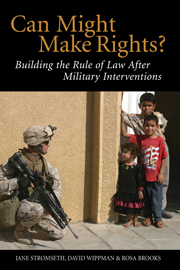Book contents
- Frontmatter
- Contents
- Acknowledgments
- 1 Introduction: A New Imperialism?
- 2 Interventions and International Law: Legality and Legitimacy
- 3 What Is the Rule of Law?: A Pragmatic Definition and a Synergistic Approach
- 4 Blueprints for Post-Conflict Governance
- 5 Security as Sine Qua Non
- 6 The Challenge of Justice System Reform
- 7 Accountability for Atrocities: Moving Forward by Looking Backward?
- 8 Creating Rule of Law Cultures
- 9 Enhancing Rule of Law Efforts: Planning, Funding, and Local Ownership
- 10 Conclusion
- Index
5 - Security as Sine Qua Non
Published online by Cambridge University Press: 05 June 2012
- Frontmatter
- Contents
- Acknowledgments
- 1 Introduction: A New Imperialism?
- 2 Interventions and International Law: Legality and Legitimacy
- 3 What Is the Rule of Law?: A Pragmatic Definition and a Synergistic Approach
- 4 Blueprints for Post-Conflict Governance
- 5 Security as Sine Qua Non
- 6 The Challenge of Justice System Reform
- 7 Accountability for Atrocities: Moving Forward by Looking Backward?
- 8 Creating Rule of Law Cultures
- 9 Enhancing Rule of Law Efforts: Planning, Funding, and Local Ownership
- 10 Conclusion
- Index
Summary
As George Tanham, an international security and counterinsurgency expert, wrote of Vietnam, “[s]trange as it may seem, the military victory is the easiest part of the struggle. After this has been attained, the real challenge begins: the reestablishment of a secure environment opens a new opportunity for nation building.” Tanham's observation could just as easily be applied to the cases studied in this book. The terminology has evolved – the United States, in particular, now prefers “stability operations” to “nation building.” But Tanham's point still holds. Military intervention marks only the first, and usually the simplest, phase of the much larger and more complex task of restructuring the governing institutions of the affected state and encouraging the ascendance of actors and social norms capable of making those institutions successful.
As Tanham suggests, the reestablishment of a secure environment is “the sine qua non of post-conflict reconstruction.” Absent basic security, efforts to reform political institutions, adopt new laws, promote national reconciliation, and jump-start economic growth are destined to fail. In most cases, however, military victory does not, as Tanham seemed to assume, correlate directly with the establishment of the secure environment that in turn “opens a new opportunity for nation building.” In fact, most of the cases studied in this book do not entail a clear military victory. In many cases, interveners used force selectively against one or more parties to the conflict, but their primary goal was to compel a negotiated settlement rather than to achieve an outright military victory.
- Type
- Chapter
- Information
- Can Might Make Rights?Building the Rule of Law after Military Interventions, pp. 134 - 177Publisher: Cambridge University PressPrint publication year: 2006
- 1
- Cited by



